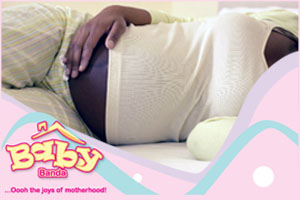SLEEPING POSITIONS
During the 2nd and 3rd trimester, its gets particularly difficult to be able to get a comfortable sleeping position. If you’re accustomed to sleeping on your stomach or on your back, you must adjust to sleeping on your side. It will be physically impossible to lie on your stomach when you are heavy with child, and doctors warn against sprawling flat on your back. When you lie on your back, the weight of the pregnant uterus slows the return of blood to your heart, which reduces blood flow to the foetus. That means the baby is getting less oxygen and fewer nutrients. Make use of our Baby Banda L pillow that helps get you to a comfortable position by offering the whole body support that you require at this time.
EATING DURING PREGNANCY
What you eat during pregnancy can affect your health and the health of your baby. You need to eat extra, healthy calories while you are pregnant. Your diet should be balanced and contain at least 3 regular meals and snacks or 5 to 6 small meals each day.
SNACK SMART
Eat when you feel hungry. Eat healthy. When you want a snack, have one of these:
Banana or an apple, mango, pineapple slices or other fruit; vanilla yoghurt or Mala; cheese slice on whole wheat bread or sandwich of your choice; carrot sticks; nuts (peanuts, cashew nuts, etc) and raisins; freshly made fruit juice e.g. watermelon juice, passion, orange; hard cooked egg, etc.
SOME FOODS CAN MAKE YOU SICK OR HURT YOUR BABY.
DO NOT EAT:
- Fish high in mercury, such as tilefish, swordfish, king mackerel, shark and white (Albacore) canned tuna; also large-mouth bass or catfish.
- Raw oysters or fish like sushi or sashimi.
- Rare or raw meat, chicken or turkey (cook it medium to well-done).
- Deli meat spreads (like deviled ham).
- Raw or soft-cooked eggs.
- Raw (unpasteurized) cheese such as feta, blue or Brie.
- Raw (unpasteurized) milk, juice or cider.
- Drink 100% fruit juices, milk and water. Try to stay away from coffee and soda.
HOW MUCH WEIGHT SHOULD YOU GAIN?
Healthcare providers agree that the best advice is to gain based on your weight before pregnancy. Your healthcare provider may use your pre-pregnancy Body Mass Index (BMI) to determine your weight category. BMI is based on your height and weight. Gaining within the ranges below should help your baby grow and keep you healthy too. If Before Pregnancy, You Were:
• Average weight – you should gain 12 kg – 15kg
• Underweight – you should gain 13kg – 18kg
• Overweight – you should gain 7 kg – 11kg
• Obese – you should gain 7kg or less
EXERCISE IN PREGNANCY
Exercise helps you feel better during pregnancy. It prepares you for labor and helps get you back in shape after the baby is born. Ask your medical provider what would be good exercises for you.
Exercise benefits are:
- Reduces backaches, constipation and swelling.
- Gives you energy, you feel less tired.
- Improves your mood.
- Improves your posture.
- Makes your muscles stronger.
- Works off stress.
- Helps you sleep better.
Walk at least 30 minutes a day
You can break it up through the day. Walk 10 minutes in the morning, 10 at lunch and another 10 after dinner. Don’t get overheated. Drink lots of water. Remember your balance changes when you are pregnant. Wear low heels and shoes with support. If you are unable to talk normally while exercising, you are doing too much. Stop an exercise if it hurts. During the last three months, it can be harder to do many exercises. Avoid jumping and quick changes that can strain your joints. After 20 weeks, don’t do any exercises while lying on your back.
Do the Pelvic Tilt
This exercise will help reduce backache. Stand with your back to the wall. Your feet should be slightly apart, with your heels about 6 inches from the wall. Push the small of your back flat against the wall. As you do this, your pelvis will rock forward. Your lower back should remain touching the wall. Hold for a count of 5, and then release. Do 10 exercises at least twice a day.
As your uterus grows, your pelvic joints relax and your lower back muscles stretch. That can make your back hurt. A backache that goes all the way around to your stomach may be a sign of labor. A backache can also be a sign of a bladder infection. Tell your healthcare provider about your backaches.
To Reduce Back Pain
- Use good posture. Tuck your buttocks in. When your abdomen sticks out in front, it is hard on your back.
- Squat down instead of bending over from the back.
- Get more rest.
- Wear flat or low-heeled shoes.
- Avoid lifting more than 25 pounds.
- Use a firm mattress on the bed.
- Massage your back muscles, or use warm, moist heat on your back.
- Do the pelvic rock exercise.













